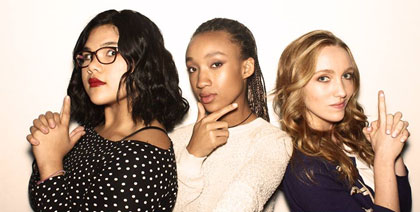Section navigation
 Belissa, Rhiannon, and Zariya
Belissa, Rhiannon, and Zariya
How do you express your feelings, thoughts, and ideas? Maybe it’s through dancing, singing, art, your clothes, or your hair style. Self-expression can take many forms. It’s all about finding something that you enjoy and that makes you feel proud. Belissa, Rhiannon, and Zariya like to express themselves by writing poetry then performing their poems in front of lots of other people. It’s called spoken-word poetry, and there are competitions across the country. Belissa, Rhiannon, and Zariya are Teen Poetry Slam Champions, and they’ve performed on live television. Learn more about spoken-word poetry, what it means to be a Teen Poetry Slam Champion, and why Belissa, Rhiannon, and Zariya think it’s important that all girls have a way to express themselves.

How old are each of you?
Belissa: Zariya and I are 16, and Rhiannon is 17.

For girls who don't know, what's spoken-word poetry?
Zariya: Spoken-word poetry is poetry that's written to be performed rather than read. The poems are delivered in a 3½-minute, high-energy performance. The poems usually have some sort of political message hidden in them. They can also be about something personal, like a person you love. Most importantly, spoken-word poetry is usually written for a "slam." A slam is a competition where you perform your poetry and compete against other poets.

How did you become interested in spoken-word poetry?
Zariya: Growing up, I was always sensitive. I didn't think it was cool to be that way, so I pretended to be tough like the girls in cartoons I used to watch, like "Kim Possible." I wrote about all the not-so-tough parts of me in my journals.
Then the Get Lit program came to my high school freshman year. Get Lit is designed to get more teens reading and writing and encourages self-expression. The instructors had us write original poems in response to classic poems. My classic poem was "Still I Rise" by Maya Angelou. I wrote a poem called "Bony" and used it to audition for the slam team. I made it (Belissa and Rhiannon did, too) and began to watch videos of other slam poets on the Internet for inspiration. I saw other people who actually felt more powerful because they shared their softer side. That made me feel it was okay for me not to be tough. It made me want to share how I felt about things. Finally having a way to express myself made spoken-word poetry something I knew would be a big part of my future.

What messages do you try to share through your performances?
Rhiannon: During our performances, we really want to make sure that girls know to be gentle and not too hard on themselves. We want them to take time out of the day to take care of themselves and each other.

What does it mean to be Teen Poetry Slam Champions, and how does it feel?
Rhiannon: Being Teen Poetry Slam Champions means that we've won a lot of competitions and we've performed in many cool venues. But it really means that we have amazing people who want to watch us perform and read our work. Without their support, we never would have gotten this far!

What's the best part about performing?
Belissa: Sometimes after shows people come up to us and tell us how much our poems mean to them or how the poems affect them. Those are my favorite parts about performing. I love knowing that our work has a purpose and can help someone. Words can be powerful.

Why do you think self-expression is important?
Zariya: It's important to get to know yourself, in every way. Self-expression allows you to show people who you are, even if you're always changing. You can keep creating new poems or different types of art that show who you are today, tomorrow, and every day after that.

For girls who may not like to write, are there any other activities they could try to express themselves?
Belissa: The arts are limitless! There is painting, sculpting, theater, singing, dance, jewelry making, macaroni mosaics, and more. Anything you enjoy doing that you feel helps show people who you are is self-expression.

Is there anything else you'd like to share?
Rhiannon: I've found that if something is really bothering me, I'll talk with my mom or trusted friends, like my godmothers or mentors. For me, the best thing to do with those feelings is try to make them into a poem I can use in a competition. By the time I write it, memorize it, and perform it in a room full of strangers, it's impossible to be upset. It helps me examine many sides of the subject, which allows me to work through the issues that the bad feelings came from.
Watch Belissa, Rhiannon, and Zariya perform their poem "Somewhere in America."
If you think writing will help you understand your feelings better, start journaling. For more information about dealing with feelings, visit our Your Feelings section.
Content last reviewed August 11, 2015
Page last updated August 11, 2015








